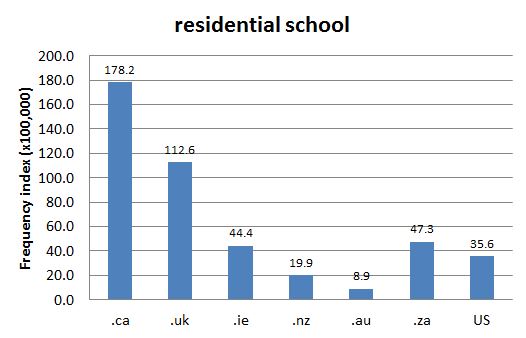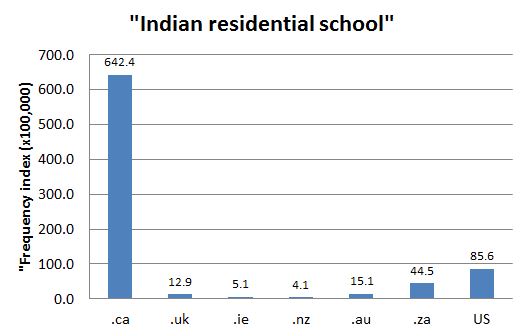DCHP-2
residential school DCHP-2 (October 2016)
n. — recently historical, euphemism, Aboriginal
a boarding school for Aboriginal children intended to isolate them from their families and assimilate them into mainstream culture.
Type: 6. Memorial — Outside of Canada, a residential school refers to a school where pupils live during the academic year. In Canada, the term residential school, however, is associated with the injustice perpetrated against Aboriginal peoples by the Canadian government and various religious organizations. Many people saw the schools as the best way to move supposedly primitive Aboriginal people into the modern world. First opened in the 1870s, with attendance made compulsory in 1920, residential schools prohibited children from practicing their cultural traditions and speaking their own languages (Walker 2009: 1). More than 150,000 Aboriginal children were forcibly taken from their homes and prepared to work as domestic servants or labourers. The children often suffered physical, verbal, mental and sexual abuse (see the 1992 quotation). The decision to close residential schools was first taken in 1969, but the last residential school closed only in 1996 (see Canadian Encyclopedia reference).
The residential school policy has had a lasting negative impact on Aboriginal communities in particular but also on Canada as a whole (see the 2006 and 2013 quotations). As Walker (2009: 10) observes in a report published by the Library of Parliament, the profound trauma resulting from generations of abuse in residential schools has been "linked to other social and psychological problems involving alcoholism, drug abuse, depression, suicide, prostitution, gambling, homelessness, sexual abuse, violence, poverty, lack of parenting skills, and lack of a capacity to sustain healthy families and communities" (see Parliament of Canada reference). Moreover, residential schools and the attitudes and policies that engendered them have been largely responsible for the near extinction of almost all Aboriginal languages in Canada (Walker 2009: 7). Today, the residential school system in Canada is considered a form of genocide, having been labelled so by critics and politicians alike, such as former Prime Minister Paul Martin (see CBC reference) and former Grand Chief of the Assembly of First Nations, Matthew Coon Come (see IRSSS reference).
On 11 June 2008, the Canadian government issued a formal apology for the residential school system. Prime Minister Stephen Harper apologized on behalf of all Canadians, acknowledging that many children died while attending residential schools, many were abused, and all were “deprived of the care and nurturing of their parents, grandparents and communities” (see AANDC reference). Harper asked for “forgiveness of the Aboriginal peoples of this country for failing them so profoundly” (see Prime Minister of Canada reference). Note that this apology has been criticized because it is seen as treating residential schools as a historical anomaly, rather than part of a sustained and deliberate government policy. The cultural impact of the residential school system in Canada is demonstrated by the continued high frequency of the term in Canada (see Chart 1), which is significant given that these schools have not been in operation since the mid-1990s. The more specific term, "Indian residential school", is even more prevalent in Canada (see Chart 2). Strictly speaking, the change in meaning from 'boarding school' to 'institution of forced assimilation' is also, in addition to being a Canadianism of Type 6 - Memorial, also Type 3 - Semantic Change.
See also Gage-5, s.v. "residential school", which is marked "Cdn. North.", ITP Nelson, s.v. "residential school", which is marked "Canadian", COD-2, s.v. "residential school", which is marked "Cdn hist.", and OED-3, s.v. "residential school" (a), which is marked "Canad.".See also: Sixties Scoop Truth and Reconciliation Commission residential school survivor reconciliation week assimilation reconciliation missing and murdered women First Nations language Aboriginal language
- Indian (& Eskimo) Residential School is the older euphemism; the plain residential school became popular after World War II.
References:
- AANDC "Statistics on the"Implementation of the Indian Residential Schools Settlement Agreement" Accessed 27 Aug. 2013
- CBC "Paul Martin accuses residential schools of 'cultural genocide'" Accessed 27 Aug. 2013
- COD-2
- Canadian Encyclopedia s.v. "Residential Schools" Accessed 6 May 2016
- Gage-5
- IRSSS "History" Accessed 27 Aug. 2013
- ITP Nelson
- OED-3
- Parliament of Canada "The Indian Residential Schools Truth and Reconciliation Commission" Accessed 20 May 2014
- Prime Minister of Canada "Harper offers full apology on behalf of Canadians for the Indian Residential Schools System" Accessed 27 Aug. 2013
- Walker (2009)
Images:
Chart 1: Internet Domain Search, 27 Aug. 2013
Chart 2: Internet Domain Search, 27 Aug. 2013

